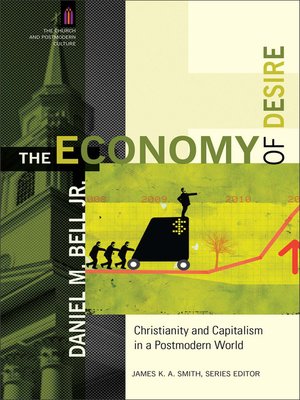The Economy of Desire
ebook ∣ Christianity and Capitalism in a Postmodern World · The Church and Postmodern Culture
By Daniel M. Bell Jr.

Sign up to save your library
With an OverDrive account, you can save your favorite libraries for at-a-glance information about availability. Find out more about OverDrive accounts.
Find this title in Libby, the library reading app by OverDrive.



Search for a digital library with this title
Title found at these libraries:
| Library Name | Distance |
|---|---|
| Loading... |
In this addition to the award-winning Church and Postmodern Culture series, respected theologian Daniel Bell compares and contrasts capitalism and Christianity, showing how Christianity provides resources for faithfully navigating the postmodern global economy.
Bell approaches capitalism and Christianity as alternative visions of humanity, God, and the good life. Considering faith and economics in terms of how desire is shaped, he casts the conflict as one between different disciplines of desire. He engages the work of two important postmodern philosophers, Deleuze and Foucault, to illuminate the nature of the postmodern world that the church currently inhabits. Bell then considers how the global economy deforms desire in a manner that distorts human relations with God and one another. In contrast, he presents Christianity and the tradition of the works of mercy as a way beyond capitalism and socialism, beyond philanthropy and welfare. Christianity heals desire, renewing human relations and enabling communion with God.
Bell approaches capitalism and Christianity as alternative visions of humanity, God, and the good life. Considering faith and economics in terms of how desire is shaped, he casts the conflict as one between different disciplines of desire. He engages the work of two important postmodern philosophers, Deleuze and Foucault, to illuminate the nature of the postmodern world that the church currently inhabits. Bell then considers how the global economy deforms desire in a manner that distorts human relations with God and one another. In contrast, he presents Christianity and the tradition of the works of mercy as a way beyond capitalism and socialism, beyond philanthropy and welfare. Christianity heals desire, renewing human relations and enabling communion with God.







